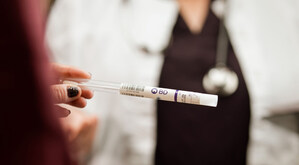BD Expands Efforts to Combat Antimicrobial Resistance with New Diagnostic Test in Europe
Fully-automated BD Phoenix™ CPO detect test helps detect dangerous pathogens
FRANKLIN LAKES, N.J., Sept. 26, 2017 /PRNewswire/ -- BD (Becton, Dickinson and Company) (NYSE: BDX), a leading global medical technology company, today announced the launch1 of the first automated phenotypic test to detect and classify carbapenemase-producing organisms (CPO). Available as part of the BD Phoenix™ automated microbiology system in Europe, the new BD Phoenix™ CPO detect test will help hospitals identify and contain infections caused by CPO, while potentially combating an increase in antimicrobial resistance (AMR).
According to the Centers for Disease Control and Prevention (CDC), CPOs, specifically carbapenem-resistant Enterobacteriaceae (CRE), represent a prominent AMR threat to public health because these dangerous microbes may be resistant to nearly all available antibiotics.2 These organisms are also on the World Health Organization (WHO) priority pathogen list as critical threats to public health3. Reported rates of mortality associated with certain CPO infections vary widely from 22 to 72 percent4. When CPOs are detected, rapid implementation of infection prevention measures are needed to prevent further transmission.
The BD Phoenix CPO detect test, included on BD Phoenix™ gram-negative panels, identifies CPOs and provides the Ambler classification of the enzyme produced. In contrast to conventional phenotypic methods for CPO detection that can take up to 96 hours, the BD Phoenix™ CPO detect test can detect CPOs accurately in under 36 hours.
The test allows hospitals and laboratories to categorize microbial resistance facilitating the rapid implementation of infection control procedures and the selection of appropriate antibiotics. It provides information that can be used to support hospitals in managing their antimicrobial stewardship programs more effectively.
"The BD Phoenix CPO detect test is a completely new type of phenotypic test, and its range of capabilities is unmatched by all currently marketed tests," said Kenneth S. Thomson, PhD, FIDSA, FAAM, FASM clinical professor of Pathology and Laboratory Medicine, University of Louisville School of Medicine. "It represents a significant advance in meeting an important clinical need."
Fully integrated within BD Phoenix panels, the new BD Phoenix CPO detect test enables laboratories to offer a more comprehensive antimicrobial susceptibility test profile while improving laboratory process efficiency. The test is available in two configurations, offering flexibility to customers; a combo panel that detects the presence of CPOs, and the BD Phoenix™ emerge panel that detects the presence of CPOs and if positive, provides the Ambler classification of the carbapenemase.
"The BD Phoenix CPO detect test gives laboratories an accurate and cost-effective method to rapidly identify CPOs and support patient management," said Steve Conly, vice president of Microbiology for BD. "Along with the BD Phoenix™ M50, this first-to-market phenotypic automated test to detect CPOs, expands BD's portfolio of solutions for identification and antimicrobial susceptibility testing (ID/AST) and is another example of the company's commitment to combating AMR."
Visit bd.com/ds for more information.
About BD Phoenix™
The BD Phoenix™ automated identification and susceptibility testing system is part of BD's line of products for rapid, accurate and reliable detection of microbial organisms. Using BD Phoenix products, laboratories can identify organisms and understand emerging antimicrobial resistance, improving communication with clinicians to improve both patient management and antibiotic stewardship.
About BD
BD is a global medical technology company that is advancing the world of health by improving medical discovery, diagnostics and the delivery of care. BD leads in patient and healthcare worker safety and the technologies that enable medical research and clinical laboratories. The company provides innovative solutions that help advance medical research and genomics, enhance the diagnosis of infectious disease and cancer, improve medication management, promote infection prevention, equip surgical and interventional procedures, optimize respiratory care and support the management of diabetes. The company partners with organizations around the world to address some of the most challenging global health issues. BD has nearly 50,000 associates across 50 countries who work in close collaboration with customers and partners to help enhance outcomes, lower health care delivery costs, increase efficiencies, improve healthcare safety and expand access to health. For more information on BD, please visit bd.com.
| Contacts: |
|
| Gwen Gordon |
Monique N. Dolecki |
| BD Public Relations |
BD Investor Relations |
| 858.812.3724 |
201.847.5378 |
____________________________________
1 Currently available for sale in Europe. Product not available for sale in the US.
2 Centers for Disease Control and Prevention (CDC). Antibiotic Resistance Threats in the United States, 2013. Atlanta: CDC; 2013.
3 World Health Organization. Global Priority List of Antibiotic-Resistant Bacteria to Guide Research, Discovery, and Development of New Antibiotics. February 2017. http://www.who.int/medicines/publications/WHO-PPL-Short_Summary_25Feb-ET_NM_WHO.pdf?ua=1. Accessed March 20, 2017.
4 Tumbarella, M. et al. (2015) J Antimicrob Chemother 70: 2133-2143
SOURCE BD (Becton, Dickinson and Company)
Related Links
WANT YOUR COMPANY'S NEWS FEATURED ON PRNEWSWIRE.COM?
Newsrooms &
Influencers
Digital Media
Outlets
Journalists
Opted In





Share this article